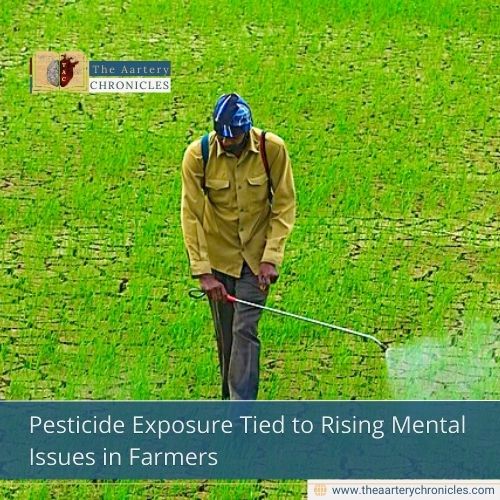

Pesticide Exposure Tied to Rising Mental Issues in Farmers
A new study has raised fresh concerns about the long-term health impact of farm chemicals, with pesticides linked to memory loss and depression in older farmers living in West Bengal. The research, published in the Indian Journal of Medical Research, suggests that decades of regular pesticide exposure may be harming the brain and mental well-being of rural agricultural workers. Moreover, experts warn that without stronger safety practices, these health risks could grow rapidly across farming communities.
A Closer Look at the Study
The study was led by specialists from the ICMR–Centre for Ageing and Mental Health, Bangur Institute of Neurosciences, Sagore Dutta Hospital and the Institute of Health & Family Welfare in Kolkata. It focused on the Galsi II block of Purba Bardhaman, an area that reflects the wider rural population of West Bengal, where nearly 69% of people live outside cities and depend heavily on agriculture.
Researchers screened 808 adults aged 50 and above who had been living in the area for at least five years. Although the sample size was moderate, the authors noted that it provides a reliable snapshot of common neurological and mental-health concerns in rural India.
High Rates of Cognitive and Mental-Health Problems
The findings were striking:
More than one in five participants, a total of 180 people, showed symptoms of cognitive issues, depression, or possible movement disorders.
These cognitive problems included:
- Difficulty remembering information
- Trouble concentrating
- Slower thinking
- Reduced reasoning ability
About 12.5% had only cognitive impairment, a level that is higher than that reported in several urban studies from northern and southern India. Another research project from eastern India, which used the same testing method, reported mild cognitive impairment at 14.9% in city residents, showing that rural populations may be just as vulnerable, if not more so.
Stronger Exposure, Higher Risk
Importantly, the degree of pesticide exposure clearly made a difference. Farmers who handled pesticides regularly were nearly three times more likely to develop neurological or mental-health problems compared to those with little or no exposure.
The risk increased even further for:
- Individuals exposed for more than 30 years
- Farmers who sprayed pesticides at least once a week
Additionally, those working exclusively in farming had the weakest memory scores, greater difficulty performing daily activities and higher depression levels.
These findings reinforce the keyphrase once again: pesticides linked to memory loss are not just an environmental concern it is emerging as a major public-health issue.
Expert Views: Risk Is Consistent With Global Evidence
Neurologists say the study’s results fit well with existing scientific knowledge.
Dr. Manjari Tripathi, head of neurology at AIIMS, noted that pesticides have long been associated with disorders such as Parkinson’s disease, Alzheimer’s dementia and other neurodegenerative conditions. She emphasised that both the amount and the duration of exposure are major factors influencing long-term risk.
Conclusion
Researchers warn that without swift policy action, such as improved training, protective gear and regulated pesticide use, India’s rural elderly could face increasing rates of memory loss, depression and disability. As the study clearly shows, pesticides linked to memory loss and mental-health problems are becoming an urgent and growing challenge for farming communities.
Source: Inputs from various media Sources
I’m a pharmacist with a strong background in health sciences. I hold a BSc from Delhi University and a pharmacy degree from PDM University. I write articles and daily health news while interviewing doctors to bring you the latest insights. In my free time, you’ll find me at the gym or lost in a sci-fi novel.
- Priya Bairagi
- Health News and Updates,People Forum
- 27 November 2025
- 20:00








